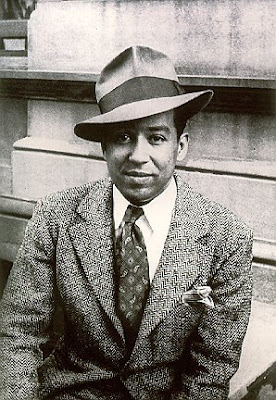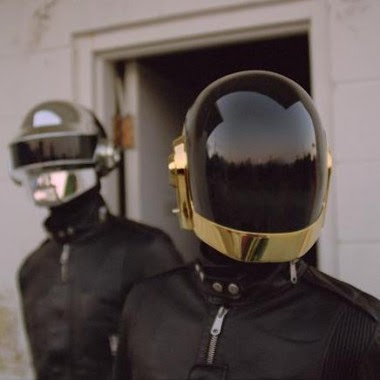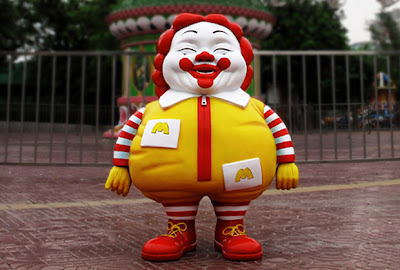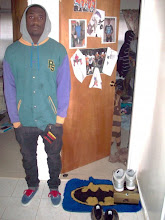my boo britt put me on with this essay. i think about the "racial mountain" all the time, as a lot of people do; it's so hard though, the whole concept and all. sometimes, i'm afraid of saying i'm a "black artist," because that prefix is a prison in itself. sometimes i want to be called "an artist that is black," or simply an artist: an artist with versatility. we have the ability to crossover into different worlds without changing who we are. but even the diction that is used is kinda constricting. i'm not black, i'm jamaican, "black" is a racial term that caucasians created to strip us of our unique culture, to imprison us, to let us grow complacent with neutrality. but sometimes i don't want to be defined my my culture. i'm simply a human being, belonging to the human race. (ironically, "out of many, one people" seems to ring in my head) the land of jamaica was onced colonized by those that came up with the term "black." but how does that make me different from them? am i not imprisoning the warden that kept me shackled for 20 years? and contained my parents for 30 more? and so on and so on. it is inherent in our nature to stereotype. its a defense mechanism to keep us out of harms way.
fuck human nature. but that's my opinion. check out the essay on the way down
[In 1926, the Harlem Renaissance was in full flower; the poet Langston Hughes was one of its central figures. In this essay, Hughes urges black intellectuals and artists to break free of the artificial standards set for them by whites.]
One of the most promising of the young Negro poets said to me once, "I want to be a poet--not a Negro poet," meaning, I believe, "I want to write like a white poet"; meaning subconsciously, "I would like to be a white poet"; meaning behind that, "I would like to be white." And I was sorry the young man said that, for no great poet has ever been afraid of being himself. And I doubted then that, with his desire to run away spiritually from his race, this boy would ever be a great poet. But this is the mountain standing in the way of any true Negro art in America--this urge within the race toward whiteness, the desire to pour racial individuality into the mold of American standardization, and to be as little Negro and as much American as possible.
But let us look at the immediate background of this young poet. His family is of what I suppose one would call the Negro middle class: people who are by no means rich yet never uncomfortable nor hungry--smug, contented, respectable folk, members of the Baptist church. The father goes to work every morning. He is the chief steward at a large white club. The mother sometimes does fancy sewing or supervises parties for the rich families of the town. The children go to a mixed school. In the home they read white papers and magazines. And the mother often says, "Don't be like niggers" when the children are bad. A frequent phrase from the father is, "Look how well a white man does things." And so the word white comes to be unconsciously a symbol of all the virtues. It holds for the children beauty, morality, and money. The whisper of "I want to be white" runs silently through their minds. This young poet's home is, I believe, a fairly typical home of the colored middle class. One sees immediately how difficult it would be for an artist born in such a home to interest himself in interpreting the beauty of his own people. He is never taught to see that beauty. He is taught rather not to see it, or if he does, to be ashamed of it when it is not according to Caucasian patterns.
For racial culture the home of a self-styled "high-class" Negro has nothing better to offer. Instead there will be perhaps more aping of things white than in a less cultured or less wealthy home. The father is perhaps a doctor, lawyer, landowner, or politician. The mother may be a social worker, or a teacher, or she may do nothing and have a maid. Father is often dark but he has usually married the lightest woman he could find. The family attend a fashionable church where few really colored faces are to be found. And they themselves draw a color line. In the North they go to white theaters and white movies. And in the South they have at least two cars and a house "like white folks." Nordic manners, Nordic faces, Nordic hair, Nordic art (if any), and an Episcopal heaven. A very high mountain indeed for the would-be racial artist to climb in order to discover himself and his people.
But then there are the low-down folks, the so-called common element, and they are the majority--may the Lord be praised! The people who have their nip of gin on Saturday nights and are not too important to themselves or the community, or too well fed, or too learned to watch the lazy world go round. They live on Seventh Street in Washington or State Street in Chicago and they do not particularly care whether they are like white folks or anybody else. Their joy runs, bang! into ecstasy. Their religion soars to a shout. Work maybe a little today, rest a little tomorrow. Play awhile. Sing awhile. O, let's dance! These common people are not afraid of spirituals, as for a long time their more intellectual brethren were, and jazz is their child. They furnish a wealth of colorful, distinctive material for any artist because they still hold their own individuality in the face of American standardization. And perhaps these common people will give to the world its truly great Negro artist, the one who is not afraid to be himself. Whereas the better-class Negro would tell the artist what to do, the people at least let him alone when he does appear. And they are not ashamed of him--if they know he exists at all. And they accept what beauty is their own without question.
Certainly there is, for the American Negro artist who can escape the restrictions the more advanced among his own group would put upon him, a great field of unused material ready for his art. Without going outside his race, and even among the better classes with their "white" culture and conscious American manners, but still Negro enough to be different, there is sufficient material to furnish a black artist with a lifetime of creative work. And when he chooses to touch on the relations between Negroes and whites in this country with their innumerable overtones and undertones, surely, and especially for literature and the drama, there is an inexhaustible supply of themes at hand. To these the Negro artist can give his racial individuality, his heritage of rhythm and warmth, and his incongruous humor that so often, as in the Blues, becomes ironic laughter mixed with tears. But let us look again at the mountain.
A prominent Negro clubwoman in Philadelphia paid eleven dollars to hear Raquel Meller sing Andalusian popular songs. But she told me a few weeks before she would not think of going to hear "that woman." Clara Smith, a great black artist, sing Negro folk songs. And many an upper-class Negro church, even now, would not dream of employing a spiritual in its services. The drab melodies in white folks' hymnbooks are much to be preferred. "We want to worship the Lord correctly and quietly. We don't believe in 'shouting.' Let's be dull like the Nordics," they say, in effect.
The road for the serious black artist, then, who would produce a racial art is most certainly rocky and the mountain is high. Until recently he received almost no encouragement for his work from either white or colored people. The fine novels of Chestnutt go out of print with neither race noticing their passing. The quaint charm and humor of Dunbar's dialect verse brought to him, in his day, largely the same kind of encouragement one would give a sideshow freak (A colored man writing poetry! How odd!) or a clown (How amusing!).
The present vogue in things Negro, although it may do as much harm as good for the budding colored artist, has at least done this: it has brought him forcibly to the attention of his own people among whom for so long, unless the other race had noticed him beforehand, he was a prophet with little honor. I understand that Charles Gilpin acted for years in Negro theaters without any special acclaim from his own, but when Broadway gave him eight curtain calls, Negroes, too, began to beat a tin pan in his honor. I know a young colored writer, a manual worker by day, who had been writing well for the colored magazines for some years, but it was not until he recently broke into the white publications and his first book was accepted by a prominent New York publisher that the "best" Negroes in his city took the trouble to discover that he lived there. Then almost immediately they decided to give a grand dinner for him. But the society ladies were careful to whisper to his mother that perhaps she'd better not come. They were not sure she would have an evening gown.
The Negro artist works against an undertow of sharp criticism and misunderstanding from his own group and unintentional bribes from the whites. "O, be respectable, write about nice people, show how good we are," say the Negroes. "Be stereotyped, don't go too far, don't shatter our illusions about you, don't amuse us too seriously. We will pay you," say the whites. Both would have told Jean Toomer not to write "Crane." The colored people did not praise it. The white people did not buy it. Most of the colored people who did read "Cane" hated it. They are afraid of it. Although the critics gave it good reviews the public remained indifferent. Yet (excepting the work of Du Bois) "Cane" contains the finest prose written by a Negro in America. And like the singing of Robeson, it is truly racial.
But in spite of the Nordicized Negro intelligentsia and the desires of some white editors we have an honest American Negro literature already with us. Now I await the rise of the Negro theater. Our folk music, having achieved world-wide fame, offers itself to the genius of the great individual American Negro composer who is to come. And within the next decade I expect to see the work of a growing school of colored artists who paint and model the beauty of dark faces and create with new technique the expressions of their own soul-world. And the Negro dancers who will dance like flame and the singers who will continue to carry our songs to all who listen--they will be with us in even greater numbers tomorrow.
Most of my own poems are racial in theme and treatment, derived from the life I know. In many of them I try to grasp and hold some of the meanings and rhythms of jazz. I am sincere as I know how to be in these poems and yet after every reading I answer questions like these from my own people: Do you think Negroes should always write about Negroes? I wish you wouldn't read some of your poems to white folks. How do you find any thing interesting in a place like a cabaret? Why do you write about black people? You aren't black. What makes you do so many jazz poems?
But jazz to me is one of the inherent expressions of Negro life in America: the eternal tom-tom beating in the Negro soul--the tom-tom of revolt against weariness in a white world, a world of subway trains, and work, work, work; the tom-tom of joy and laughter, and pain swallowed in a smile. Yet the Philadelphia clubwoman is ashamed to say that her race created it and she does not like me to write about it. The old subconscious "white is best" runs through her mind. Years of study under white teachers, a lifetime of white books, pictures, and papers, and white manners, morals, and Puritan standards made her dislike the spirituals. And now she turns up her nose at jazz and all its manifestations--likewise almost everything else distinctly racial. She doesn't care for the Winold Reiss portraits of Negroes because they are "too Negro." She does not want a true picture of herself from anybody. She wants the artist to flatter her, to make the white world believe that all Negroes are as smug and as near white in soul as she wants to be. But, to my mind, it is the duty of the younger Negro artist, if he accepts any duties at all from outsiders, to change through the force of his art that old whispering "I want to be white," hidden in the aspirations of his people, to "Why should I want to be white? I am a Negro--and beautiful!"
So I am ashamed for the black poet who says, "I want to be a poet, not a Negro poet," as though his own racial world were not as interesting as any other world. I am ashamed, too, for the colored artist who runs from the painting of Negro faces to the painting of sunsets after the manner of the academicians because he fears the strange un-whiteness of his own features. An artist must be free to choose what he does, certainly, but he must also never be afraid too what he might choose.
Let the blare of Negro jazz bands and the bellowing voice of Bessie Smith singing Blues penetrate the closed ears of the colored near-intellectuals until they listen and perhaps understand. Let Paul Robeson singing Water Boy, and Rudolph Fisher writing about the streets of Harlem, and Jean Toomer holding the heart of Georgia in his hands, and Aaron Douglas drawing strange black fantasies cause the smug Negro middle class to turn from their white, respectable, ordinary books and papers to catch a glimmer of their own beauty. We younger Negro artists who create now intend to express our individual dark-skinned selves without fear or shame. If white people are pleased we are glad. If they are not, it doesn't matter. We know we are beautiful. And ugly too. The tom-tom cries and the tom-tom laughs. If colored people are pleased we are glad. If they are not, their displeasure doesn't matter either. We build our temples for tomorrow, strong as we know how, and we stand on top of the mountain, free within ourselves.

thanks britt :)
Tea's Gone.

 these ideas can be applied to a regular john doe. personally, i would like to live by my principles and values, but that wish is often threatened by interest in material items and personal style. as much as i would love people to remember me for my public facade when i die, what i would really like is for people to remember my ideas. however i understand that as i develop my public identity, i can bring ideas, drawings, poems and other piece of work much easier as my public identity becomes a brand, in which people can buy into and identify with (very similar to Christian Rich's approach). although i am more ideologically aligned with the chicago-based team, i have a great appreciation for Bangalter's "theory of art and the artist."
these ideas can be applied to a regular john doe. personally, i would like to live by my principles and values, but that wish is often threatened by interest in material items and personal style. as much as i would love people to remember me for my public facade when i die, what i would really like is for people to remember my ideas. however i understand that as i develop my public identity, i can bring ideas, drawings, poems and other piece of work much easier as my public identity becomes a brand, in which people can buy into and identify with (very similar to Christian Rich's approach). although i am more ideologically aligned with the chicago-based team, i have a great appreciation for Bangalter's "theory of art and the artist." 




